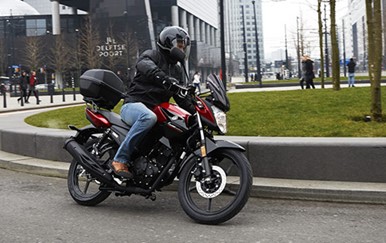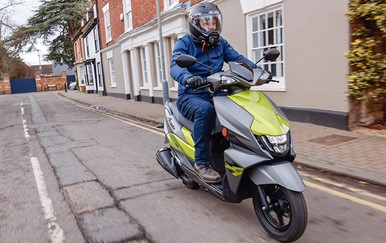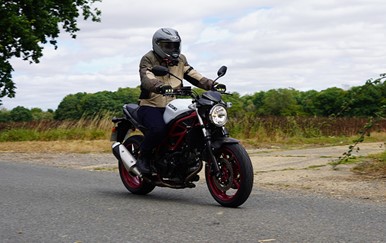Nowadays there are so many options and add-ons available to personalise your policies, it ultimately can be difficult to understand what is and isn't the best practice.
In this blog, we will be going through and debunking the most common motorcycle insurance myths there is today, so without further ado - let’s get into it, shall we?
1. Full coverage extends to your other bikes
Although it is possible to add on or buy this type of insurance policy, this cover does not automatically apply to every fully comprehensive policy by default. It is crucial that you always check through your insurance documents so you know what you are covered for.
If you are unsure, you can call your insurance provider's contact centre to confirm if you have this cover already, or if you can add it on.
Of course, at Lexham we also offer multi-bike insurance, so if this is something you’re looking for it is worth giving us a call.
2. Pillion cover is included for full licence holders

Being covered for pillion use depends on several factors, not just the cover afforded under the terms of the policy – you will also need to check your licence and be aware of any weight restrictions on your motorcycle.
If you have the correct licence and your bike meets the requirements (rear footpegs and seat), you can usually add this cover on to your policy quite easily – you just need to make sure you ask for it when setting up the policy.
3. Insurance premiums automatically go down after each year on cover
Assuming you’ve had no convictions or claims during your time on cover, you should be building up a no-claims bonus every year you don’t claim – as well as becoming a more experienced rider with each passing year. Very often this will mean your premium will go down, but there are a number of other factors that affect the cost of insurance.
Changes to how injury compensation pay-outs are calculated, rises in Insurance Premium Tax (IPT), more whiplash-style claims, and rising repair bills all play a part in determining how insurers and brokers have to price their products.
Separately, lots of insurers also have a maximum no-claims bonus, and this can vary between insurers – so check whether your insurer has a ceiling for a claims discount, as there aren’t always unlimited!
At Lexham, we’ve put together an article on how best to save money on your motorcycle insurance.
4. Naming another driver or rider can lower the policy cost

Adding a more experienced person as the main rider, such as a parent, could mean a lower premium; but if this is not for legitimate purposes then can be classed as insurance fraud or “fronting” and may cause your insurer to cancel your policy or decline a claim. If you’re the main driver, you must declare this.
Also, it is common for your insurance premium to be based on the youngest or least experienced rider on the policy, not the policyholder so you are not automatically guaranteed a cheaper quote if there is a more experienced rider on the policy.
5. No need to report no-fault accidents to your insurer
If you have an accident that wasn’t your fault, or something happens to your vehicle that wasn’t your fault, you must still tell your insurance provider no matter how big or small. Failing to declare details regarding any incidents or possible claims could result in your policy being cancelled, or they may ask you to reimburse the cost of any claim.
Very often not telling your insurer about an incident will add to the cost of any claim, especially if another person is involved – the quicker you tell your insurer the better placed they’ll be to keep the cost of a claim to a minimum.
It is important to remember that an insurance policy is a contract, and you are obliged to the terms that are outlined to you when setting up the policy and in the policy documents that are provided to you.
6. Electric motorbikes need no insurance or road tax
If you own an electric motorcycle, you will need to insure it. Electric motorbikes and mopeds work in the same way as their petrol-fuelled counterparts meaning that if you plan on riding your bike on public roads, you’re going to need to have insurance.
However, when it comes to road tax I have got some good news for you (for now). Up until 1st April 2025, all electric vehicles (including motorcycles and mopeds) are exempt from road tax, meaning that you will have to pay the small price of £0 a year.
It is worth noting that even if you don’t have to pay for road tax, you still need to register your bike with the DVLA using a V5 document to notify them that you will be using your vehicle on the roads.
7. You can ride a motorbike home without insurance

If you’re planning to pick up a shiny new or used motorcycle, in order to ride it home, you will need to have it both insured and taxed.
Insuring a motorcycle you intend to ride on public roads is a legal requirement, and failure to do so can mean you will end up with a pretty pricey fine, penalty points on your licence, or potentially even a riding disqualification.
If you are unsure about who you wish to insure your bike with, or perhaps you are still shopping around, there are some insurers out there who can offer 24-hour insurance coverage that will allow you to bring the bike home until you make a final decision.
The Last Stop!
So there you have it, I hope you enjoyed my full run down on some of the most common insurance myths.
Lastly, if you have an insurance query of your very own that you’re not sure of and need answering, check out our motorcycle insurance FAQs for more information, or give our friendly team a call, they’ll be more than happy to help - 01379 646 529.
Alternatively, get a quote for your motorcycle insurance online!










